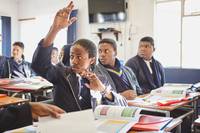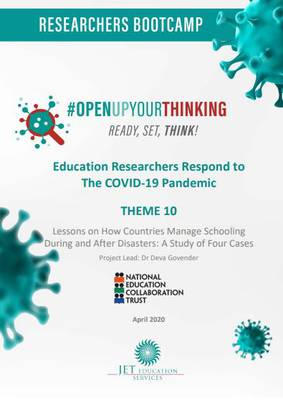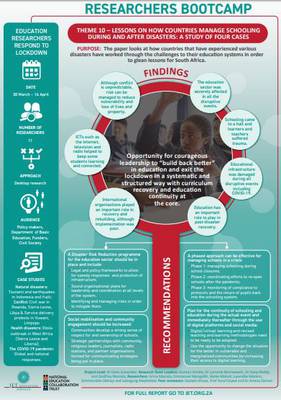Theme 10: Lessons on How Countries Manage Schooling During and After Disasters
Post-Disaster Schooling - A study of how countries managed their education system during a disaster and the steps they took to re-establish normality
Lead researcher: Dr Deva Govender, National Education Collaboration Trust (NECT)
Co-leads: Duncan Hindle, National Education Collaboration Trust; Dr Lorraine Marneweck, Class Act, Dr Daisy Reddy and Godfrey Nkondo
Co-leads: Duncan Hindle, National Education Collaboration Trust; Dr Lorraine Marneweck, Class Act, Dr Daisy Reddy and Godfrey Nkondo
Peer reviewer: Prof Yusuf Sayed, Centre for International Teacher Education (CITE), Cape Peninsula University of Technology; Dr Amina Osman, Education Adviser, Economic, Youth and Sustainable Development Directorate, Commonwealth Secretariat Godwin Khosa, Chief Executive officer of NECT
Researcher: Arina Sibanda, Emmanuel Mangalibi, Buhle Moholi, Lwandile Ndaleni, Simthembile Sibhayi and Lebogang Maphelela
Download the final report and infographic
RESEARCH QUESTIONS
- What event/s led to an interruption in schooling and in the education system?
- What impact did the event have on schooling and on the system?
- During the actual event, what possibilities (if any) existed for some form of schooling or education to take place?
- What strategies did the country come up with to resume schooling and to restart the education system after the event?
- What can South Africa learn from this to re-start education after the COVID-19 disaster: (a) at a system level and (b) at the school and district levels?
METHODOLOGY
Case Studies
The objectives of the case studies are to:
- Contribute to the process of developing knowledge in the discipline of education in emergencies and reconstruction;
- Provide focused input for UNESCO International Institute for Educational Planning (IIEP) training programmes targeting government officials and others in education in emergencies and reconstruction;
- Identify and collect documentation on the management of education in various countries;
- Capture some of the undocumented memories of practitioners;
- Analyse the responses in very different situations to educational provision in times of crisis;
- Increase the dissemination of information and analysis on education in emergencies and reconstruction.



